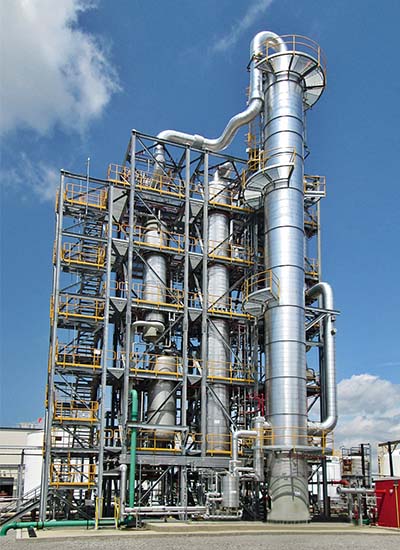This website uses cookies so that we can provide you with the best user experience possible. Cookie information is stored in your browser and performs functions such as recognising you when you return to our website and helping our team to understand which sections of the website you find most interesting and useful.
Challenge
The client’s original methanol recovery system was designed in the mid 1900s and the existing columns were no longer performing well. Chloride stress corrosion cracking was leading to leaks and unsafe process safety conditions, in addition to frequent system shutdowns for welding. The existing columns also didn’t have enough stages to achieve the desired separation, requiring an increased reflux ratio and resulting in poor energy efficiency and higher energy consumption.
SOLUTION
The replacement columns provided by Koch Modular consist of an alcohol stripping column and a methanol recovery column. The alcohol stripping column is a 66” ID trayed column fabricated from Alloy 2205 duplex stainless steel. The methanol recovery column is a 87” ID packed column fabricated from T316L stainless steel, and is designed as free standing per the site wind & seismic values provided.
Alloy 2205 duplex stainless steel plate is an alloyed plate containing chromium, molybdenum, and nickel nitrogen. It offers high general and chloride stress cracking resistance properties. T-316L stainless steel, on the other hand, is a molybdenum-bearing austenitic stainless steel which minimizes deleterious carbide precipitation as a result of welding. The addition of molybdenum in both of these materials improves general corrosion and chloride pitting resistance, and provides higher creep, stress-to-rupture, and tensile strength at elevated temperatures. Material testing was performed on both of these materials to verify their appropriateness to the client’s process and ensure no chloride stress corrosion cracking takes place.
The replacement columns provided also had an increased number of stages, optimal packing, reduced column pressure, and excess reflux eliminated such that the energy consumption was reduced. The modifications introduced to the system by Koch Modular engineers also resulted in 40% higher capacity as compared to the existing columns.
RESULTS
The system is composed of three process modules containing a distillation column, reflux tanks, pumps and heat exchangers. A large diameter distillation column free stands alongside the modules where it is accessed via outrigger platforms. Access to each floor is provided by an adjacent Stair Tower. Working in conjunction with the client, this system replaced and expanded the capacity of their existing distillation units.
The installation of the modules was successfully completed and the system has been running since with no issues.

